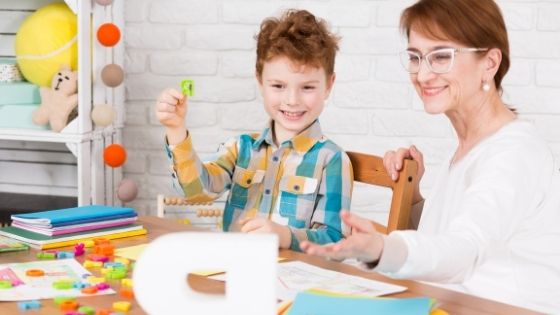By a child’s fifth birthday, 85 percent of their brain will form. During this time of rapid brain development, children will benefit from early childhood education.
They will learn how to interact with peers and learn new skills.
Finding an early childhood program is a great way to give your child a head start in life. Read on to learn more about why early childhood education is important for your child’s education.


What is Early Childhood Education?
Birth to 8 years is early childhood in the child development field. During this time, a child’s brain is tuned into the environment around them. They are learning and growing constantly as each experience is new to them.
During this time of rapid brain growth, children need a specific type of stimulation. Early childhood education focuses on milestones that children should reach during this period. They will learn social-emotional skills and the beginnings of traditional school like math and reading. When you look for a preschool for a child, try to see the specific curriculum they have for improving the child’s cognitive skill. Always choose the right preschool as it is one of the important stepping stones.
A high-quality program will have a well-rounded curriculum that supports development. The program should also address the child’s health, nutrition, and needs of the family. Educators will assess the children to promote learning and identify any concerns.
Benefits of an Early Education Program
Research shows that children who are in a quality early childhood program are less likely to be in special education than children who do not attend. Children are also less likely to get held back a grade. They are more likely to graduate high school as well.
Social Skills
Children who attend an early childhood education program are exposed to people other than their own families. It allows children to interact with those who may have different ideas and ways of doing things. They also have the chance to practice making friends with new children.
Self-Esteem
When children are in an early childhood program, they gain confidence in their interactions with teachers and other kids. Children have the chance to practice in different scenarios that they may encounter later in childhood. It builds their confidence in how they interact with others.
When exposed to a positive learning environment, children have the confidence to approach new tasks and problem solve. Children will feel safe exploring new skills and interests.
Develop a Love of Learning
Many early childhood programs follow a play-based curriculum. Montessori schools like this one believe that a child’s work is play. It promotes self-paced and individualized learning.
Children can choose activities based on what interests them. They can work on these interests with little interference from educators. The teachers observe and track progress while facilitating play.
When children get to choose what to learn based on their interests, they develop a life-long love of learning.
What Are the Types of Early Childhood Programs?
From birth to 8 years old, there are many options for early childhood programs. They range from infant care to early elementary school. Each stage of childhood has schooling options to go along with it.
Infant Programs
Programs for infants are warm and inviting with little clutter and lots of room to move. There are areas for sleeping, diaper changing, and eating. Family photos can get hung around the room to give babies a sense of familiarity.
Toys should be interesting and versatile. Common objects can be used to fulfill play-based needs such as dumping and stacking. A variety of the same toy allows babies to compare as they get older.
There should also be a variety of board books available to the infants. Furniture should be sized for babies to promote independence. Infants should be allowed to play and explore freely with guidance from caregivers.
Toddler Programs
Toddlerhood begins around 16 months and goes through a child’s third birthday. This is a stage of rapid development for children. Toddler teachers provide a safe environment for learning where the child feels important.
Toddler programs offer hands-on play where a child can be free to be active and explore. Toddlers learn through all the senses, so a classroom that promotes this is crucial. There should be a variety of objects and toys for young children.
Toddlers learn through play as they experience new things and learn to interact with other people. Teachers can help facilitate these interactions and give a child guidance during play. Educators can help a child build knowledge as they play by connecting interests to learning.
Preschool Programs
Quality preschool programs give children the groundwork for further education. The preschool teachers will set learning goals for children that are attainable yet challenging. There is a mix of planned group activities and child-led play and learning.
Teachers during this time will assess the needs of the children in the class to see where they may need support. During preschool, play becomes more structured. Children begin learning the basics they will need when they enter school.
Benefits of Becoming an Early Childhood Educator
When you choose to get a teaching degree, you can shape the minds of young children. You have the opportunity to nurture their love of learning and create a safe space for them to explore. You will be able to use your creativity to teach children how to navigate the world of education.
As a teacher of young children, you are often one of the first relationships they will have outside of the home. You play a role in teaching them about life and how to be successful. You have the chance to create a positive and secure learning environment for them.
Choose an Early Childhood Program for Your Child
Early childhood education increases the likelihood of success for children. It provides a safe learning environment for children to explore their interests. Children reap the benefits of quality early childhood education for years to come.
When you send your kid to school, they learn how to interact with others. They form relationships with teachers and peers that benefit them all through school.
If you found this article helpful, you can find more like it on our website!
















